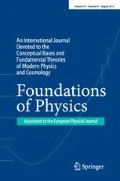Abstract
In order to make reliable predictions in any region of human activity, it is necessary to distinguish clearly what is based on experience and what is a construction of intellect. The theory of knowledge developed in the present paper is an attempt to devise a set of axioms that demarcate experience, as the only source of our knowledge of the external world, from the ideas, scientific models, and theories by means of which the scientific predictions are made. After a discussion of the causality in relation to the laws of nature, the axioms of the expounded theory are formulated in the formalism of set theory. The theory is then applied to some problems in physics to demonstrate its usefulness.
Similar content being viewed by others
References
Plato,Theaetetus (Great Books of the Western World, Vol. 7) (Britannica, Chicago, 1952).
Aristotle,Metaphysics (Great Books of the Western World, Vol. 8) (Britannica, Chicago, 1952).
Aristotle,Nicomachean Ethics, 1139 b–1143 b (Great Books of the Western World, Vol. 9) (Britannica, Chicago, 1952).
Cicero,Academica Posteriora, c. VIII (Harvard University Press, Cambridge, Mass. 1979).
Plato,The Republic, Book V–VIII (Great Books of the Western World, Vol. 7) (Britannica, Chicago, 1952).
Plato,Phaedo (Great Books of the Western World, Vol. 7) (Britannica, Chicago, 1952).
Plato,Phaedrus (Great Books of the Western World, Vol. 7) (Britannica, Chicago, 1952).
Aristotle,Posterior Analytics (Great Books of the Western World, Vol. 8) (Britannica, Chicago, 1952).
Plotinus,The Six Enneads (Great Books of the Western World, Vol. 17) (Britannica, Chicago, 1952).
D. Hume,An Enquiry Concerning Human Understanding (Great Books of the Western World, Vol. 35) (Britannica, Chicago, 1952).
B. Russell,A History of Western Philosophy (Simon and Schuster, New York, 1967).
A. J. Ayer,Philosophy in the Twentieth Century (Random House, New York 1982).
Cicero,De Divinatione, c. LVIII (Harvard University Press, Cambridge, Mass., 1971).
R. P. Feyman, R. B. Leighton, and M. Sands,The Feynman Lectures on Physics (Addison-Wesley, Reading, Mass., 1963) Vol. 1, pp. 2–7.
M. Schlick,Allgemeine Erkenntnislehre, (Springer, Berlin, 1918), pp. 98–99.
R. Descartes,Discourse on the Method of Rightly Conducting the Reason (Great Books of the Western World, Vol. 31) (Britannica, Chicago, 1952).
R. Descartes,Meditations on First Philosophy (Great Books of the Western World, Vol. 31) (Britannica, Chicago, 1952).
R. Descartes,Objections Against the Meditations, and Replies (Great Books of the Western World, Vol. 31) (Britannica, Chicago, 1952).
B. Russell,The Problems of Philosophy (Oxford University Press, London, 1973).
B. Russell,Introduction to Mathematical Philosophy, 2nd ed. (Allen & Unwin, London, 1920).
A. N. Whitehead and B. Russell,Principia Mathematica, Vols. 1–3, 2nd ed. (Cambridge University Press, London, 1925–1927).
I. Kant,Kritik der reinen Vernunft (VMA-Verlag, Wiesbaden, 1979). English translation:The Critique of Pure Reason (Great Books of the Western World, Vol. 42) (Britannica, Chicago, 1952).
L. Wittgenstein,Tractatus Logico-Philosophicus (Routledge & Kegan Paul, London 1971). Published first in German under the titleLogisch-philosophische Abhandlung inAnn. Naturphilos., 1921).
S. W. Hawking and G. F. R. Ellis,The Large Scale Structure of Space-Time (Cambridge University Press, London, 1973).
E. Mach,Die Mechanik in ihrer Entwicklung historisch-kritisch dargestellt, 2nd ed., pp. 213 and 455 (Brockhaus, Leipzig, 1889). English translation:The Science of Mechanics, 6th ed., pp. 280 and 580 (Open Court, Lasalle, Ill., 1960).
Sir Isaac Newton's Mathematical Principles of Natural Philosophy and his System of the World, by D. Cajori, ed. (University of California Press, Berkeley, 1960).
G. Berkeley,A Treatise Concerning the Principles of Human Knowledge (Great Books of the Western World, Vol. 35) (Britannica, Chicago, 1952) Sect. 110–117.
G. Berkeley, De Motu, inThe Works of George Berkeley (Clarendon Press, Oxford, 1901), Vol. 1, Sect. 52–65. English translation by A. A. Luce in: George Berkeley, Philosophical Works. Introduction and notes by M. R. Ayers (J. M. Dent and Sons, London, 1975).
J. Pachner,Phys. Rev. 132, 1837 (1963).
Augustine,The City of God, Book 11 (Great Books of the Western World, Vol. 18) (Britannica, Chicago, 1952), Chap. 6.
J. Locke,An Essay Concerning Human Understanding, Book II (Great Books of the Western World, Vol. 35, Ch. XIII–XVII) (Britannica, Chicago, 1952).
A. Einstein,The Meaning of Relativity, 5th ed. (Princeton University Press, Princeton, N.J., 1972).
A. Einstein and L. Infeld,Can. J. Math. 1, 209 (1949).
L. Infeld,Acta Phys. Polon. 10, 284 (1950).
J. Callaway,Phys. Rev. 92, 1567 (1953).
W. B. Bonnor,Proc. Roy. Soc. (Lond.) A226, 366 (1954).
J. Pachner,Ann. Physik 1, 351 (1958);2, 36 (1958);5, 70 (1959).
J. Pachner,Acta Phys. Polon. 20, 475 (1961);21, 439 (1962).
E. Schrödinger,Space-Time Structure (Cambridge University Press, Cambridge, 1960).
R. L. Bishop and S. I. Goldberg,Tensor Analysis on Manifolds (Macmillan, New York, 1968).
R. K. Sachs and H. Wu,General Relativity for Mathematicians (Springer, New York, 1977).
J. Pachner,Bull. Astron. Inst. Czech. 17, 105 (1966).
J. R. Oppenheimer and H. Snyder,Phys. Rev. 56, 455 (1939).
B. Datt,Z. Phys. 108, 314 (1938).
J. Pachner, inGravitation, Quanta and the Universe (Proceedings of the Einstein Centenary Symposium), A. R. Prasanna, J. V. Narlikar, and C. V. Vishveshwara, eds. (Wiley Eastern, New Delhi, 1980) p. 132 ff.
R. Penrose,Nature 236, 377 (1972).
Caesar,The Gallic War, Book III (Harvard University Press, Cambridge, Mass., 1979), Chap. 18.
Author information
Authors and Affiliations
Rights and permissions
About this article
Cite this article
Pachner, J. A theory of knowledge. Found Phys 14, 1107–1120 (1984). https://doi.org/10.1007/BF01882492
Received:
Issue Date:
DOI: https://doi.org/10.1007/BF01882492



